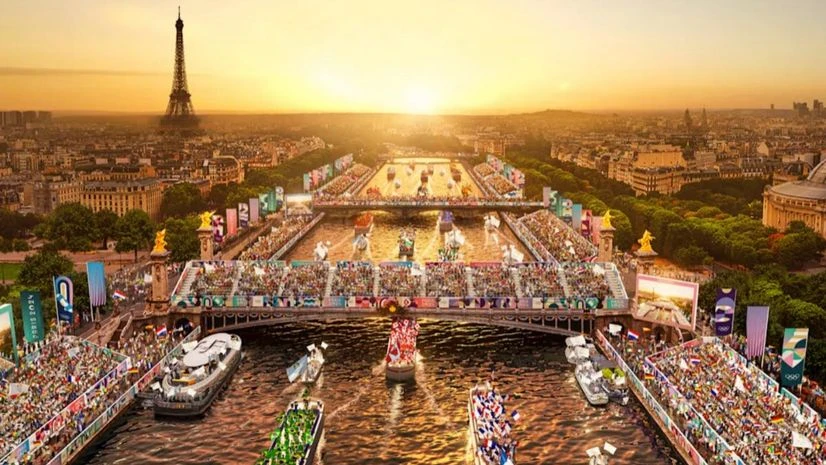Ever wondered how Paris is transforming its Olympic Village into a sustainable urban marvel for Paris 2024 and beyond?
When the French capital last hosted the Summer Olympics a century ago, the organisers were determined to unite athletes under one roof, constructing the inaugural Olympic Village — a spartan collection of furnished wood huts that was dismantled soon after.
A century later, as the Games return to the City of Lights, French officials are charting a new course. In a bid to make Paris 2024 the “most responsible and sustainable games in history,” they have embarked on a project designed for longevity.
“This village was thought up as a neighbourhood, a neighbourhood that is going to have a life afterwards,” Georgina Grenon, the Paris 2024 director of sustainability, told CNN. “Paris 2024 is renting it for a few months,” he said.
Unlike previous editions, where athletes stayed in purpose-built accommodations, this year’s Olympic village will evolve into residential and office spaces post-Games. The sprawling complex, encompassing 82 buildings, will host 6,000 office workers and provide housing for another 6,000 residents after the Paralympics conclude on September 8.
)
)
More From This Section
The initiative aims to serve as a blueprint for addressing Paris’s housing shortage crisis — a challenge exacerbated by rising interest rates, soaring property prices, and a severe supply shortfall. The demand for affordable housing is so acute that last year, a modest 10 square meter apartment in Paris' burgeoning 10th arrondissement garnered 765 applicants in less than a week, despite a monthly rent of 610 euros (Rs 54,536).
Located at the confluence of Saint-Denis, Saint-Ouen, and Ile-Saint-Denis—historically marginalised suburbs—the Olympic Village seeks to rejuvenate these areas. Organisers have committed that 32 per cent of new homes in Saint-Denis and Saint-Ouen, and 48 per cent in Ile-Saint-Denis, will be allocated for public housing.
Sustainability efforts face housing concerns
Yet, there remains a concern about potential displacement of current residents. Similar pledges made for affordable housing during London's 2012 Olympics largely fell short, a cautionary tale echoed in a 2022 BBC report revealing that out of 9,000 homes built within London's Olympic Park, fewer than 200 were rented at lower income levels.
The sustainability ethos extends beyond accommodation to every facet of the Games. Just as Paris 2024 vows to operate entirely on renewable energy, the village exemplifies eco-conscious construction. Using predominantly wood and recycled materials, the project boasts a 30 per cent reduction in carbon footprint per square meter—surpassing French ecological standards.
A third of the rooftops are adorned with solar panels, while another third feature gardens to cool interior temperatures, leveraging natural airflow along the Seine. Given predictions of above-average summer temperatures, the design prioritises athlete well-being.
Innovative solutions abound within the village, serving as a testing ground for green technologies. Sidewalks paved with seashells aim to absorb rainwater, which evaporates on hot days to cool pedestrians. Along the main thoroughfare, futuristic outdoor air filters resembling UFOs cleanse particulate matter, purifying air equivalent to 40 Olympic-sized swimming pools hourly with minimal electricity.
)
)
Geothermal cooling key to athlete comfort
Central to the village’s infrastructure is its geothermal cooling system, a critical innovation given anticipated heat challenges. Unlike conventional air conditioning, which relies heavily on energy and contributes to carbon emissions, this system taps water cooled deep underground, maintaining interior temperatures 6 to 10 degrees Celsius lower than outside conditions. Each apartment will feature individual temperature controls, ensuring comfort year-round.
Paris’ vulnerability to heatwaves emphasises on the urgency of sustainable urban planning. Acknowledging the global surge in demand for air conditioning amid escalating temperatures and energy consumption, Paris Mayor Anne Hidalgo said the village was “designed to avoid the need for air conditioning, even in very, very high temperatures.”
“We are on the brink of a precipice. Everyone, including the athletes, must be aware of this,” Hidalgo said.
“We have to trust the scientists when they help us to construct buildings in a sober way that allows us to make do without air conditioning," she said.

)